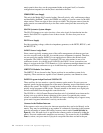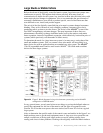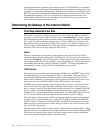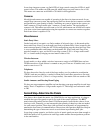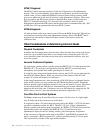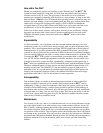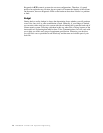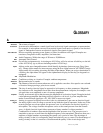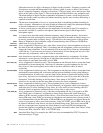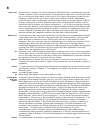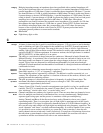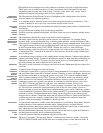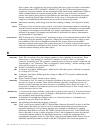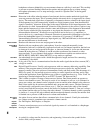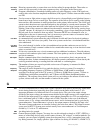130 Handbook of Intercom Systems Engineering
fabrication must be very high. Advantages of digital circuitry include 1. Frequency response, and
distortion are constant and independent of the circuitry (either it works or doesn’t, the circuitry
doesn’t change the frequency response or distortion). 2. Physical aging, wear, and tear have little
effect on the quality of the signal. 3. The circuit design and fabrication are very straightforward.
The disadvantages of digital are that a substantial investment in system / circuit design must be
made, the circuitry tends to produce and radiate interfering signals, more circuitry than analog is
required in small units.
Attenuation
The decrease in magnitude of a wave as it passes through a transmitting medium (including air,
cables, circuitry). Attenuation is also used to indicate a numerical value of the attenuation through
an electrical attenuator, for example: a 10 decibel attenuator (or “pad”).
Attenuator
(Loss Pad)
A device, usually passive, that decreases the amplitude of an electrical signal. For example: to
prevent the overload of a sensitive microphone input when the signal is much larger than a
microphone signal.
Audio
1. A term used to describe sounds within the frequency range of human hearing. Also used to
describe devices that are designed to process signals generated from audio (acoustic) energy or to
be used to generate audio (acoustic) energy. 2. In television, the sound portion of the program.
Audio
Frequency
Range of frequencies lying within the range of human hearing, often 20 hertz to 20,000 hertz,
where hertz is cycles per second.
Auto Follow
(AF)
A key assignment for listen keys only. Auto follow causes a key's listen assignment to always be
the same as the talk assignment. Thus, if you change the talk assignment, you do not also have to
change the listen assignment. You can manually activate an auto-follow listen key independently
of the talk key. If you want auto-activation (or deactivation) of listen during talk, use one of the
other auto key assignments, such as auto listen or auto mute.
Auto Functions
Auto functions are special key assignments that work with other key assignments. For further
information, see the glossary descriptions of individual auto functions: auto-follow, auto-listen,
auto-reciprocal, auto-mute, auto-table, all-call, DIM.
Auto Listen (AL)
A key assignment for listen keys only. This assignment works like auto follow, except that listen
automatically activates during talk, Auto listen is sometimes a good assignment for use with
Party-Lines or other non-keypanel devices that do not have talk-back control of matrix
crosspoints.
Auto Mute (AM)
A key assignment for listen keys only. This assignment works like auto follow, except that listen
automatically mutes during talk. Auto mute can help prevent feedback or echo when talking to
certain destinations. In some cases, you may find it works better to disable talk latching for this
type of key, because if you accidentally leave talk latched on you will never be able to hear the
destination. To disable latching, in the Keypanels / Ports menu of AZ™EDIT, check the “D”
check box for any talk key that has auto mute selected as the listen assignment.
Auto Reciprocal
(AR)
A key assignment for listen keys only. This assignment forces you to continuously listen to
whatever is assigned to the talk key. It is used commonly on keypanels which are not equipped
with listen keys, to allow listening to Party-Lines. It is also useful to force listening when it is
desirable to have an operator continuously hear a Party-Line or other source.
Auto Table (AT)
A key assignment for listen keys only, when the corresponding talk key is assigned to an IFB.
Auto Table causes a listen key's assignment to always be the same as the Listen Source for
whatever IFB is currently assigned to the talk key. (You define the Listen Source in AZ™EDIT
during IFB setup.) Auto Table is convenient in a broadcast environment when a director needs 2-
way communication with the IFB talent, AND the IFB keys are frequently reassigned during the
course of a program to talk to new talent locations. Using AZ™EDIT, several IFBs can be set up
in advance, and their Listen Sources can also be defined during setup. Then every time an IFB
talk key is reassigned on a keypanel, the Listen Source for each new IFB will automatically
become the listen key assignment for that key. For further information about Auto Tables, Listen
Sources, and IFBs, search for “IFB” in AZ™EDIT help.
AWG
American Wire Gage. For example: the AWG wire size recommended by RTS™ Systems for
intercom wiring is 22 gage.



